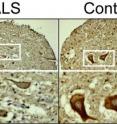Team led by LA BioMed scientist develops novel approach to study neurological disorders
A team led by a Los Angeles Biomedical Research Institute (LA BioMed) researcher developed a novel approach to efficiently identify disease relevant genes in human complex neurological disorders and demonstrated the effectiveness of this method by applying it to Amyotrophic Lateral Sclerosis (ALS), or Lou Gehrig's Disease, according to a new study reported online in the journal, Human Molecular Genetics. The approach developed by the scientists uses cutting-edge techniques to study human tissue and animal models and made possible several important findings in the course of the study.
"With this novel approach, we were able to identify new genes and proteins specifically found with a sporadic form of ALS," said LA BioMed investigator Stanislav L. Karsten, PhD, one of the study's corresponding authors. "This approach made possible the first demonstration that some of the disease specific genes found in the spinal cord may also be detected in the peripheral blood prior to the development of the disease. This finding could be vital information because it suggests that a prognostic or diagnostic test for ALS may be possible."
ALS is a neurological disorder characterized by progressive degeneration of motor neuron cells in the spinal cord and brain, which ultimately results in paralysis and death. Approximately 5,600 people in the U.S. are diagnosed with the disease each year. The sporadic form of the disease affects about two-thirds of people with ALS. It is characterized by a deterioration of upper and lower motor neuron cells.
Currently, there is no one test or procedure to ultimately establish the diagnosis of ALS. It is through a clinical examination and series of diagnostic tests, often ruling out other diseases that mimic ALS, that a diagnosis can be established.
"By developing new methods to examine disease relevant genes in neurological disorders, we move closer to unlocking the mysteries of ALS and other neurological diseases," said Dr. Karsten. "This study provides us new clues to continue to investigate the causes and to seek the therapies that can make a difference in the lives of those suffering from neurological disorders."
Source: Los Angeles Biomedical Research Institute at Harbor-UCLA Medical Center (LA BioMed)
Other sources
- Novel approach developed to study neurological disordersfrom Science DailyThu, 24 Jun 2010, 18:32:55 UTC
- Team led by LA BioMed scientist develops novel approach to study neurological disordersfrom Science BlogThu, 24 Jun 2010, 17:31:22 UTC
- Scientist develop novel approach to study neurological disordersfrom PhysorgThu, 24 Jun 2010, 17:30:44 UTC

